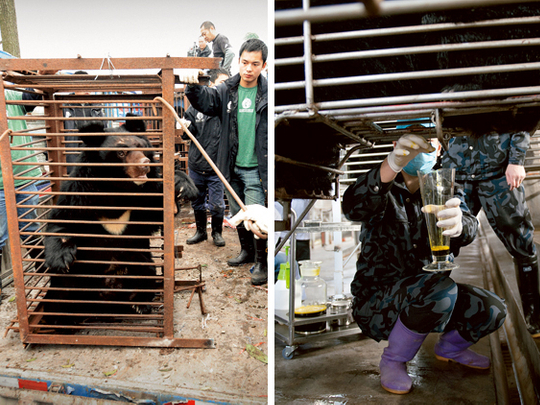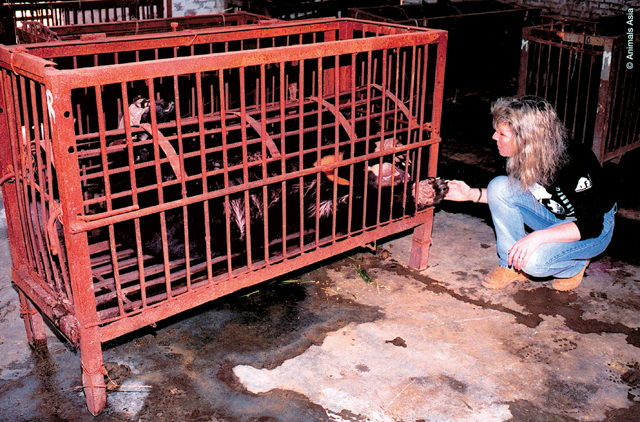
The mourners didn’t wear black, there were no wreaths or eulogies. It was a simple burial. In the grey morning rain, on a riverbank near the Chinese city of Chengdu, workers from a unique animal-rescue centre gently lowered the huge body of Saskia, a 15-year-old Asiatic black bear, into the ground. Saskia had succumbed to liver cancer, a disease that strikes down most of the bears housed at the sanctuary run by charity Animals Asia (www.animalsasia.org). All of them have been saved from the misery of China’s horrific bear bile farms.
Saskia was freed from a farm where she was kept immobile in a rusty cage. For most of her life, a dirty catheter had been permanently inserted in her abdomen to drain bile from her gall bladder to be sold and used in products ranging from health drinks and face packs to hangover cures. On release, she survived for three years at the 22-acre Moon Bear Rescue Centre where she was cared for. Across China, up to 10,000 other bears still remain in inhumane conditions. Now though, after Animals Asia has campaigned for years against the powerful bear-bile industry, the tide is turning.
Since the beginning of the year a groundswell of opposition from the Chinese public has trained the spotlight on the farmers. Jill Robinson runs Animals Asia and has devoted her life to stopping the practice. “Things are changing very much from within,” she says. “The people are speaking out. When I first started this campaign the aim was to start the debate in China and that’s always been our motive, apart from rescuing bears. The studies we conduct that show how physically and psychologically damaging the practice is, and our education programme, are getting through and people are listening and acting.
We’ve made huge progress. Over one million people have watched an undercover film made by a Chinese film crew exposing conditions on farms. We want the international community to get behind the people of China by writing to the Chinese embassies to bring an end to the trade.” Asian black bears are an endangered species and international trade in bears or bear parts is banned. However, in China, which has few animal-welfare laws, the government doesn’t class them as endangered. Bear farming is legal and regulated, albeit loosely. Although export of any bear bile products is illegal, demand for bile products in oriental countries fuels a black market.
Man-made alternative
Bear bile is used in traditional Chinese medicines, but also in many products sold over the counter such as shampoos, face packs and health drinks, which are advertised on the sides of buses and in newspapers. Bile has been a prized ingredient of traditional Chinese medicine for over 3000 years. The active ingredient, ursodeoxycholic acid (UDCA), is more abundant in bears than in any other animal. In traditional Chinese medicine bile is used to treat heat-related illnesses such as high temperatures, liver complaints and sore eyes. Bear-bile medicines are used in China, Japan, Korea, Vietnam and countries across the world with significant Asian populations.
Man-made UDCA is just as effective as that harvested from bears and is used in mainstream medicines to effectively treat gallstones, cirrhosis, autoimmune hepatitis and colon cancer. Research has also shown it may be effective in treating Parkinson’s, Huntington’s and Alzheimer’s diseases. Campaigners argue that UDCA can be replaced cheaply and effectively with the synthesised version. And research shows that much of the bile extracted from farmed bears is rendered toxic because of the infection bears develop.
The medical profession is listening, and in June this year 1,000 doctors in China made a pledge not to prescribe bear-bile medicines to patients. Animals Asia was also promised by the Chinese government that 500 bears would be released into its care. So far it houses 277 bears in Chengdu and a further 109 in a sanctuary in Vietnam. But, despite a generous compensation package offered to farmers who release their bears into its care, the charity has not rescued a bear since 2010.
Playing dirty
Jill believes this is because the bear-farming industry has now been backed into a corner by public outrage and is consolidating against any threat to expose its methods further. She says, “We can take in another 100 bears but we are not welcome anywhere because the farmers are sticking together and know that when we get new bears on site, we can show the hideous reality of the industry and expose the damage it does to these beautiful animals.”
The public movement against farming was sparked earlier this year when a Chinese company that extracts bile from captive bears tried to float on the stock market.
The move prompted furious attacks from bloggers accusing it of animal cruelty. Guizhentang Pharmaceuticals tried to counter the tide of opposition by claiming its methods were humane and civilised. According to regulations farmers are supposed to allow bears the freedom to roam when they are not being ‘milked’ for their bile, which traditionally involved placing a permanent metal or latex catheter in the animal’s gall bladder – a practice outlawed by the government and replaced by the ‘free drip method’ where bile is extracted from a surgically created fistula in the bear’s stomach.
Jill scoffs at the idea any of these methods can be humane. “The gall bladder is pulled away from where it naturally sits and pulled down to the abdominal wall where it is fixed in place and then a hole is cut into the bear. The industry has the temerity to say this doesn’t cause physical and psychological pain to the animal. It is nonsense,” she says. The success of the Animals Asia campaign has not come without cost. Jill reveals that there is a smear campaign being orchestrated against the charity and suspects it is being carried out at the behest of the industry it is trying to close down. “They hack into the internet and try to take down our website 24 hours a day.
They try and place negative stories about us online and in the media. They said we encouraged nations to boycott the Olympic Games in 2008. We never did.” Ironically industrial bear farming began in China in the 1980s as a way to protect the wild bear population from poachers, but research shows that 30 per cent of farm bears are still taken from the wild. Once captive, the bears can live for up to 20 years in intolerable conditions. Jill says, “Bears are strong animals and, unlike dogs or cats, can live through peritonitis and diseases like septicaemia, which are both common in farmed bears because of the filthy conditions they are kept in.
They suffer these horrendously painful diseases for months.” At the peak of the bear-farming industry, there were more than 400 private farms around China, mainly in the provinces of Heilongjiang, Jilin, Sichuan, and Yunnan. Before 2005, the official number was 7,002 bears in 247 farms. An official in Jilin revealed that there were at least 70 bear farms with 2,100 bears in that province alone. Only 11 of them had licences.
The campaign against bear farming also has celebrity backing, which includes Chinese basketball star Yao Ming and singer and actress Olivia Newton John. Some politicians are backing a ban, which Jill hopes will one day be implemented across the nation to end the cruel practice completely. “Mahatma Gandhi once said ‘first they ignore you, then they laugh at you, then they fight you, then you win’. We are at the fighting stage now, hopeful that common sense will soon prevail,” she says.












